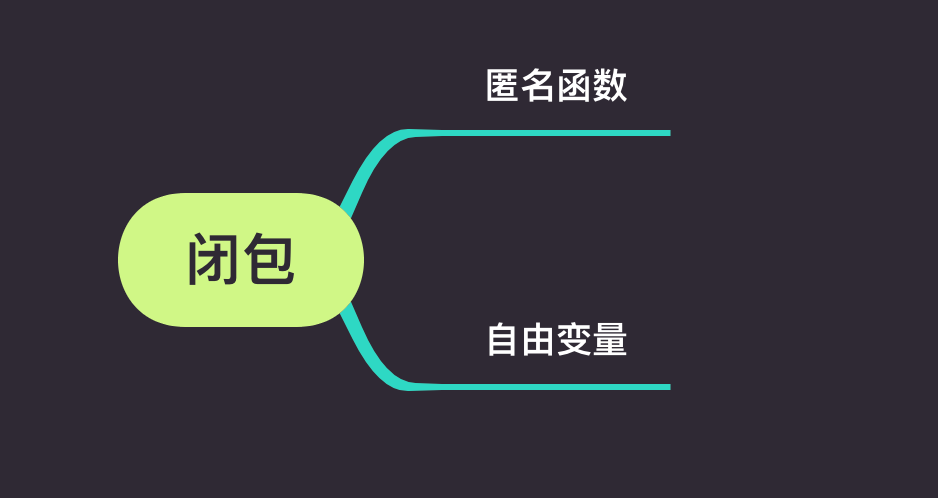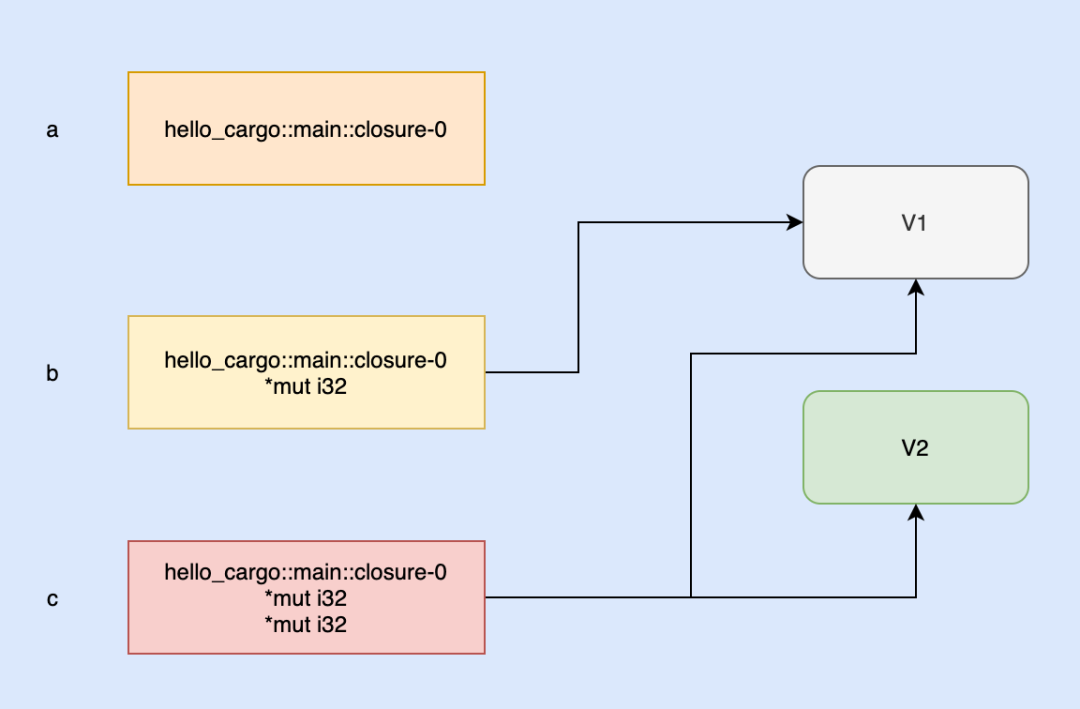Rust 闭包你了解底层实现嘛?
在计算机中,闭包 Closure, 又称词法闭包 Lexical Closure 或函数闭包 function closures, 是引用了自由变量的函数
被引用的自由变量将和函数一同存在,即使已经离开了创造它的环境也不例外。换句话说,闭包是由函数和与其相关的引用环境组合而成的实体
普通函数
函数在 Rust 里是一等公民 (first class), 即可以做为参数和返回值,和内置类型地位一样。但 Rust 函数也有一些限制,比如不支持默认参数,不支持变参,不允许多值返回等等
fn inc(x: Option<i32>) -> i32 {
let a = match x {
Some(v) => v,
None => 100,
};
a + 1
}
fn inc2(x: Option<i32>) -> i32 {
let a = x.unwrap_or(100);
a + 1
}
fn inc3(x: Option<i32>) -> (i32, i32) {
let a = x.unwrap_or(100);
(a + 1, a-1)
}但是可以通过其它方法绕过去,比如参数定义为 Option 类型,返回值定义 Result. 如果想要返回多值,可以用元组来模拟,但本质还是只返回了一个值
Option<T> 是泛型枚举,要么匹配成 Some(v) 要么是空值 None. Result<T, E> 定义要么返回泛型 T, 要么错误类型 E
嵌套函数
Rust 允许嵌套函数的,大家在 go 里这么写很常见
fn main() {
let x = 1;
fn test() {
println!("{}", x);
}
test();
}上面的例子,test 函数打印变量 x, 其它语言是没问题的,但是 rust 不行
$ cargo run
Compiling hello_cargo v0.1.0 (/Users/zerun.dong/code/rusttest/hello_cargo)
error[E0434]: can't capture dynamic environment in a fn item
--> src/main.rs:4:24
|
4 | println!("{}", x);
| ^
|
= help: use the `|| { ... }` closure form instead编译报错,可以看到,只有闭包能捕获自由变量,普通嵌套函数不行
闭包
let f = |x: i32| -> i32 { x + 1 };
闭包 || 代表传入参数,-> 后面代表返加值,{} 大括号里代表函数体
let f = |x: i32| x + 1;
同时如果函数体只有一行,可以省略 {}
let f = |x| x+1;
极致一点可以省去 i32 类型, 因为 rust 很智能,默认 x+1 会推导出闭包 f 返回类型是 i32
let f = |x| x;
如果这种情况,就需要根据第一次使用时推导出类型
fn main() {
let f = |x| x;
f(1);
f('a');
}$ cargo run
Compiling hello_cargo v0.1.0 (/Users/zerun.dong/code/rusttest/hello_cargo)
error[E0308]: mismatched types
--> src/main.rs:4:7
|
4 | f('a');
| ^^^ expected integer, found `char`
error: aborting due to previous error上面的报错,告诉我们类型是 i32, 而后来传入的是 char
闭包底层实现
fn main() {
let v1 = 100;
let v2 = 100;
let a = |x: i32| x;
let b = |x: i32| x + v1;
let c = |x: i32| x + v1 + v2;
assert_eq!(size_of(&a), 0);
assert_eq!(size_of(&b), 8);
assert_eq!(size_of(&c), 16);
}
fn size_of<T>(_: &T) -> usize {
std::mem::size_of::<T>()
}定义了三个闭包,a 普通的匿名函数,b 引用外部变量 v1, c 引用两个外部变量 v1, v2
(gdb)
c = hello_cargo::main::closure-2 (0x7fffffffe0e0, 0x7fffffffe0e4)
b = hello_cargo::main::closure-1 (0x7fffffffe0e0)
a = hello_cargo::main::closure-0
v2 = 100
v1 = 100
(gdb) ptype a
type = struct hello_cargo::main::closure-0
(gdb) ptype b
type = struct hello_cargo::main::closure-1 (
*mut i32,
)
(gdb) ptype c
type = struct hello_cargo::main::closure-2 (
*mut i32,
*mut i32,
)
(gdb) p/x &v1
$1 = 0x7fffffffe0e0
(gdb) p/x &v2
$2 = 0x7fffffffe0e4通过返汇编,我们可以看到,rust 里匿名函数其实和闭包是一样的结构,底层实现一样的。
闭包 a 是空结构体,所以大小 0 字节,而 b 拥有一个指针字段,64位平台上当然是 8 字节,c 就是 16 字节长度。打印地址,可以看到捕获的就是对应 v1, v2
同时要注意到,这个例子里,闭包在二进制包 text 代码段中用 hello_cargo::main::closure-N 结构体来表示,编号依次递增的,同时在该例子中结构体捕获的变量,其实是引用形式
闭包与所有权
fn main(){
let mut a = 1;
let mut inc = || {a+=1;a};
inc();
inc();
println!("now a is {}", a);
}关于所有权,可以参考[Rust Ownership 三原则] 。闭包 inc 捕获自由变量 a, 然后自增
# cargo run
Compiling hello_cargo v0.1.0 (/root/zerun.dong/code/rusttest/hello_cargo)
Finished dev [unoptimized + debuginfo] target(s) in 2.35s
Running `target/debug/hello_cargo`
now a is 3可以看到,当 inc 执行两次后,a 的结果是 3, 由上面可以知道此时 inc 以引用的方式捕获变量 a
fn main(){
let s = String::from("test");
let f = || {let _s = s;println!("{}", _s)};
f();
f();
}这是转移所有权的例子,堆上的字符串变量 s, 所有权转给了闭包中的临时变量 _s
fn main(){
let mut s = String::from("test");
let mut f = || {s.push('a');println!("{}", s)};
f();
f();
}例子中闭包 f 修改字符串 s, 并打印
$ cargo run
Compiling hello_cargo v0.1.0 (/Users/zerun.dong/code/rusttest/hello_cargo)
Finished dev [unoptimized + debuginfo] target(s) in 0.55s
Running `target/debug/hello_cargo`
testa
testaa执行后打印,输出和预期一样
# cargo run
Compiling hello_cargo v0.1.0 (/root/zerun.dong/code/rusttest/hello_cargo)
error[E0382]: use of moved value: `f`
--> src/main.rs:5:5
|
4 | f();
| --- `f` moved due to this call
5 | f();
| ^ value used here after move函数只能执行一次,因为当第一次执行时,_s 随后析构释放了内存,所以编译器报错
fn main(){
let s = String::from("test");
let f = move || {println!("{}", s)};
f();
f();
}如果想把变量转移给闭包,就需要显示使用 move 关键字,此时字符串 test 所有权转给了闭包 f, 当然可以多次执行,直到 f 离开作用域后一起析构,感兴趣的可以返汇编自己看一下
可以得出结论:闭包捕获变量优先只读引用,然后可变引用,最后 move 所有权
Rust 2021
Disjoint capture in closures[1] 这是 rust2021 关于闭包的更新
对于闭包 || a.x + 1, 2018 的实现是捕获整个结构体 a, 但是现在只捕获所需要用的 x
这个特性会导致一些对像在不同时间点被释放 dropped, 或是影响了闭包是否实现 Send 或 Clone trait, 所以 cargo 会插入语句 let _ = &a 引用完整结构体来修复这个问题。这个变动其实很大,细节可以参考官方文档
小结
本文先分享这些,下一篇讲讲闭包做为参数和返回值的限制,以及 Fn, FnOnce 和 FnMut, 这些点比较难理解
参考资料
[1]Disjoint capture in closures: https://doc.rust-lang.org/nightly/edition-guide/rust-2021/disjoint-capture-in-closures.html,

